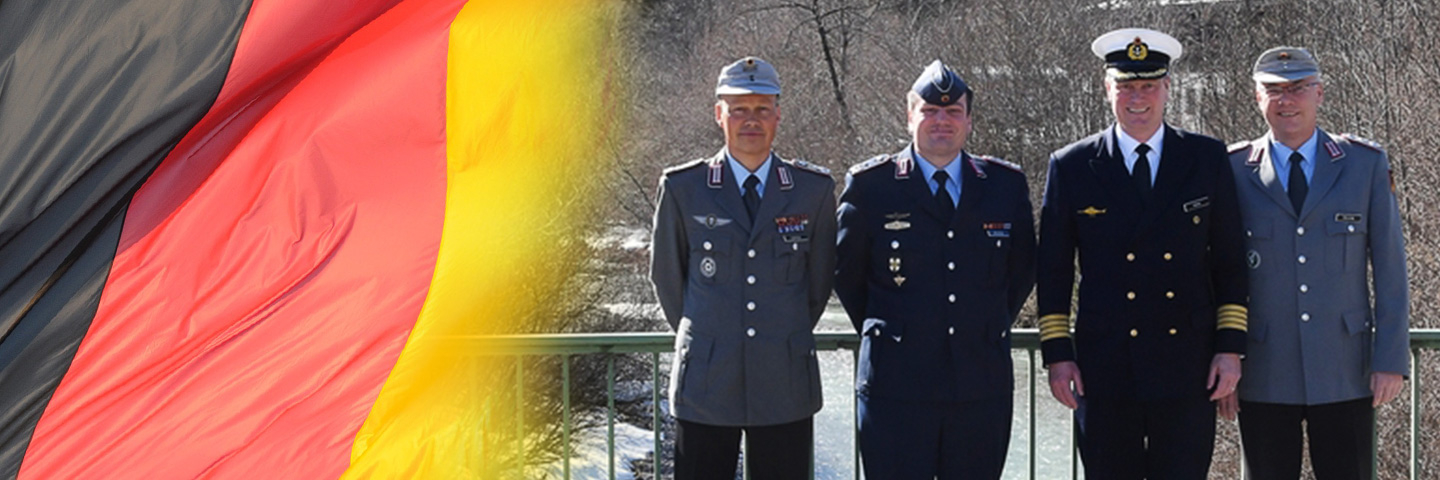
German Federal Ministry of Defense Delegation Visits Marshall Center
By German Air Force Senior Master Sgt. Mark Winkler
Public Affairs Office
George C. Marshall European Center for Security Studies
GARMISCH-PARTENKIRCHEN, Germany (March 1, 2019) – A delegation from the leading department for the Marshall Center’s German Element in the Federal Ministry of Defense in Berlin visited the German Element of the George C. Marshall European Center for Security Studies Feb. 27 here.
The delegation consisted of the new head of the Directorate-General for Politics , German Navy Capt. Axel Schulz and his desk officer for the Marshall Center, German Air Force Lt. Col. (General Staff) Stefan Pfister.
They visited the Marshall Center to get a deeper insight into the strategic significance of this unique German-American partnership, said German Army Lt. Col. (GS) Peter Kuepper, Marshall Center’s Deputy Director of Plans and Strategy.
The George C. Marshall European Center for Security Studies is a 25-year-old German-American security partnership that has produced generations of global security professionals schooled in American and German security policies.
The Marshall Center became a German-American partnership when a memorandum of agreement was signed on Dec. 2, 1994, between headquarters U.S. European Command and the German Federal Ministry of Defense. An updated MoA with Germany that increased German contribution to the Marshall Center was in October 2016.
Marshall Center’s Senior German Officer and Deputy Dean for Strategic Initiatives, German Army Col. (GS) Peter Frank and Lt. Col. Kuepper briefed the delegation on all current issues regarding the Marshall Center and the German Element and those relevant for the Federal Ministry of Defense.
Topics included: Marshall Center’s history, mission and structure; the program plan for Fiscal Year 2020 to 202; strategic initiatives; German financing processes; personnel changes in the German Element; the Marshall Center’s Program on Cyber Security Studies; and, the Loisach Group, which is a partnership between the Munich Security Conference and the Marshall Center.
Lt. Col. Kuepper said that Capt. Schulz was deeply impressed on the spectrum of the Marshall Center programs and the positive effects the center has achieved in the past 25 years of partnership with the United States.
Capt. Schulz emphasized the importance of the center for the transatlantic relations and reassured the willingness of the German Ministry of Defense to strengthen the unique partnership between the United States and Germany.
At its conception, the Marshall Center’s mission was to educate government members of former communist countries about democratic state building, good governance, and the importance of rule of law and democratic institutions. While primarily focused on Europe at the beginning, it now conducts transnational programs with participants from across the globe.
Participants who attend Marshall Center courses represent partner-nation governments from across the spectrum of government ministries. They occupy positions such as parliamentarians, senior ministers, and senior to mid-grade government officials and military officers.
With more than 13,200 alumni from 155 nations, the Marshall Center enjoys a global reputation as an institution that addresses national security challenges and advances the professional development of its participants. Many Marshall Center alumni have risen to the very highest levels within their respective governments.
During the past 25 years, the Marshall Center’s educational focus has been quick to recognize and address emerging national security threats.
